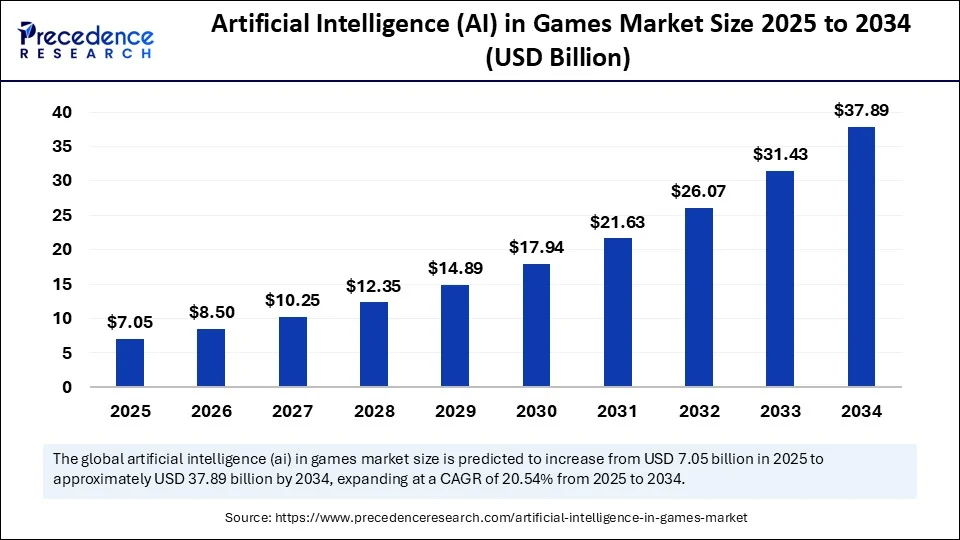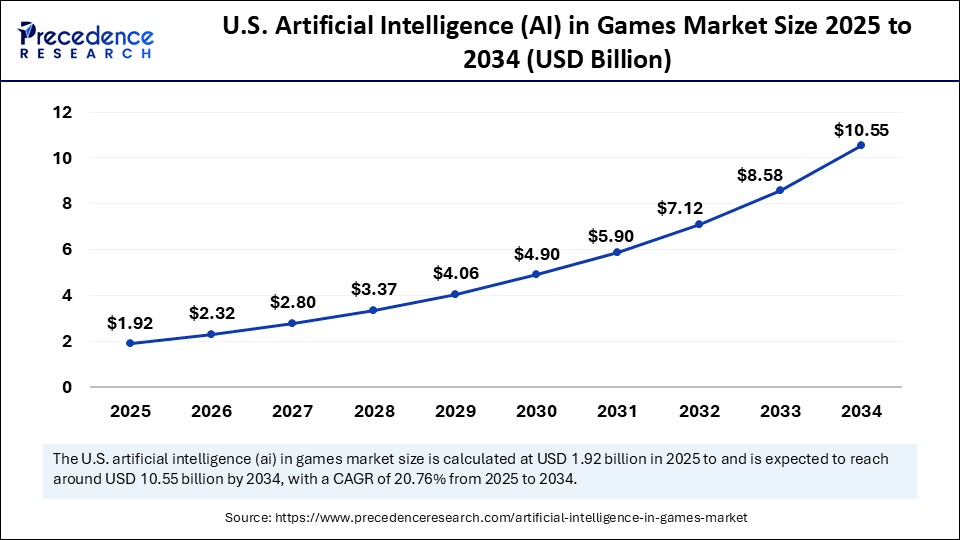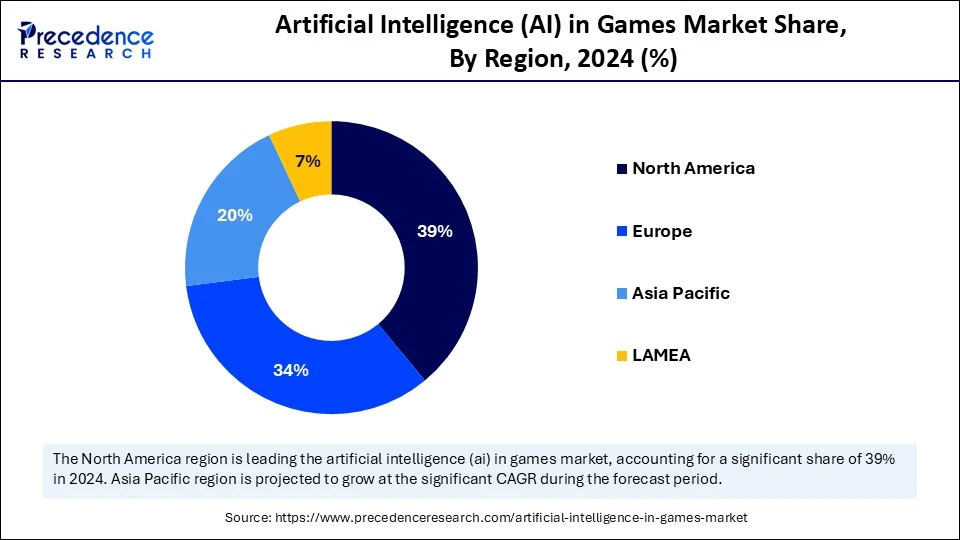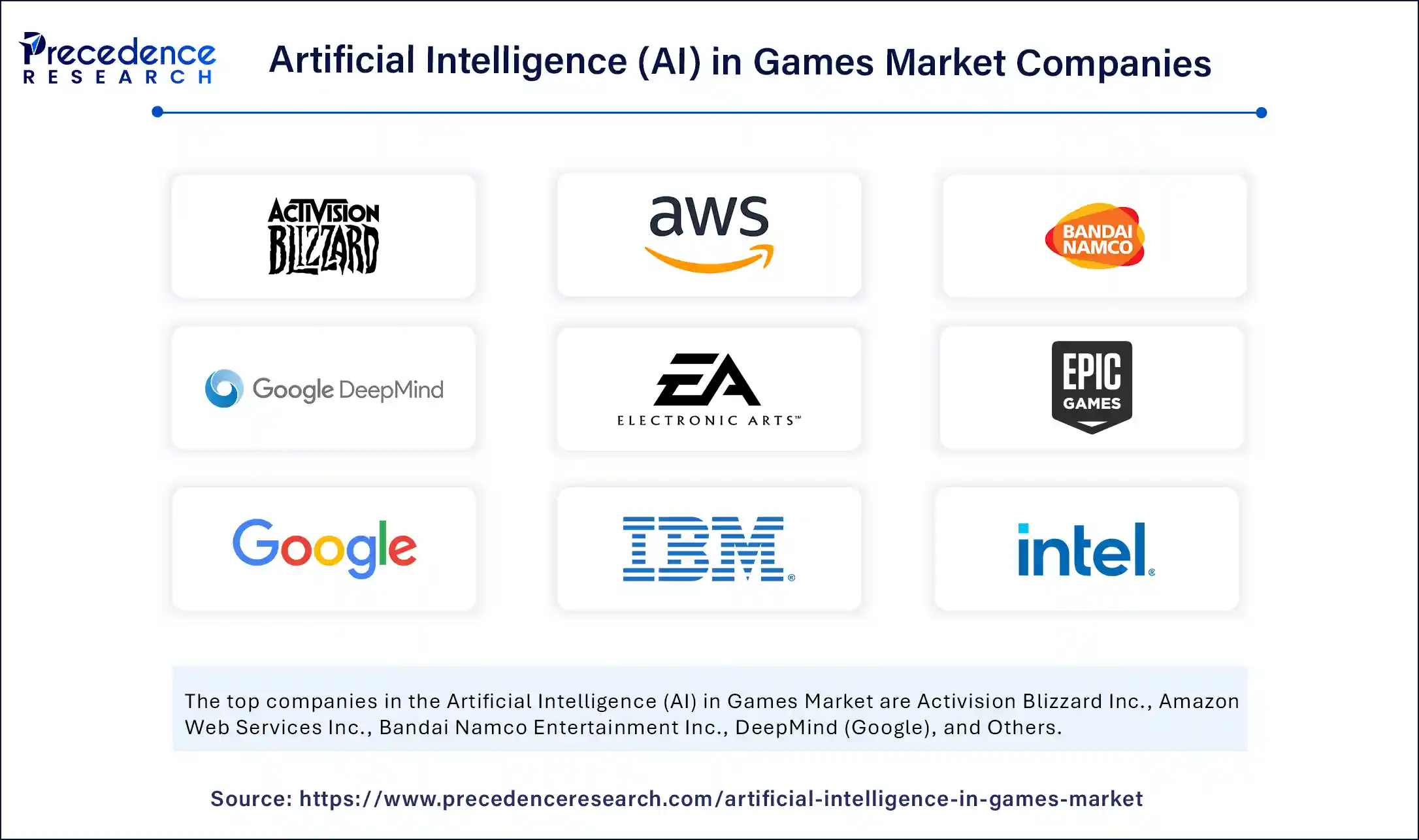Artificial Intelligence (AI) in Games Market Size and Forecast 2025 to 2034
The global artificial intelligence (AI) in games market size was estimated at USD 5.85 billion in 2024 and is predicted to increase from USD 7.05 billion in 2025 to approximately USD 37.89 billion by 2034, expanding at a CAGR of 20.54% from 2025 to 2034. The growing popularity of online gaming and the rising demand for realistic gaming experiences boost the growth of the market.

Artificial Intelligence (AI) in Games Market Key Takeaways
- In terms of revenue, the global artificial intelligence (AI) in games market was valued at USD 5.85 billion in 2024.
- It is projected to reach USD 37.89 billion by 2034.
- The market is expected to grow at a CAGR of 20.54% from 2025 to 2034.
- North America dominated the artificial intelligence (AI) in games market with the largest market share of 39% in 2024.
- Asia Pacific is expected to expand at the fastest CAGR during the forecast period.
- By game genre, the action and adventure segment captured the biggest market share of 64% in 2024.
- By game genre, the simulation segment is expected to grow at the fastest CAGR in the coming years.
- By application, the game development and design segment contributed the highest market share of 41% in 2024.
- By application, the NPC behavior/character AI segment is expected to expand at the fastest CAGR in the upcoming period.
- By component/technology, the hardware (CPUs/GPUs) segment held a major market share of 62.5% in 2024.
- By component/technology, the software and middleware segment is likely to expand at the fastest CAGR over the forecast period.
- By platform/device, the mobile (smartphone & tablet) segment held approximately 52% in 2024.
- By platform/device, the cloud / VR & AR segment is expected to grow at the fastest CAGR in the coming years.
- By technology type, the machine learning/deep learning segment generated the major market share of 38% in 2024.
- By technology type, the generative AI segment is expected to grow at the fastest CAGR during the projection period.
U.S. Artificial Intelligence (AI) in Games Market Size and Growth 2025 to 2034
The U.S. artificial intelligence (AI) in games market size was exhibited at USD 1.60 billion in 2024 and is projected to be worth around USD 10.55 billion by 2034, growing at a CAGR of 20.76% from 2025 to 2034.

What Made North America the Dominant Region in the Artificial Intelligence (AI) In Games Market?
North America dominated the market with the largest share in 2024. This is mainly due to the presence of a large number of market players and a robust gaming ecosystem, creating a fertile ground for innovation. There is a strong focus on artificial intelligence technology, with significant investments in research and development. The presence of leading institutions like MIT and Stanford, along with private corporations such as Google and Microsoft, continuously pushes the boundaries of AI in gaming. Furthermore, the early adoption of new technologies by the American audience has also fueled the growth of AI in the gaming industry.
The U.S. is a major contributor to the market. This is mainly due to the increased popularity of mobile games. The country is an early adopter of AI technology in every field, supporting market growth. The country is home to leading AI companies and gaming developers, bringing innovations into the market.

Why is Asia Pacific Experiencing the Fastest Growth in the Artificial Intelligence (AI) In Games Market?
The Asia Pacific region is expected to experience the fastest growth in the upcoming period due to a combination of factors. A primary factor is the large and ever-growing gaming population across the region, particularly in countries like China, India, and South Korea. This expansion is fueled by increased smartphone penetration, affordable internet access, and the rising popularity of mobile gaming. Furthermore, the presence of major players such as Tencent and NetEase, who are at the forefront of gaming innovation, supports regional market growth. The cultural affinity for gaming and the increasing acceptance of video games and e-sports also contribute to market growth.
Market Overview
The artificial intelligence (AI) in games market is experiencing rapid growth, driven by advancements in machine learning and deep learning. Artificial intelligence is revolutionizing the gaming industry by speeding up development, improving graphics, and enhancing overall game quality. AI enables the development of intelligent NPCs, dynamic environments, and personalized gameplay, while also preventing cheating in multiplayer games. AI-driven testing and optimization accelerate game development, with technologies like cloud, AR, VR, ML, and generative AI further transforming gaming. AR and VR, in particular, are creating more realistic gaming experiences, blurring the lines between the real and virtual worlds. Experts predict that advancements in computing power and GPUs will lead to incredibly realistic games, making it hard to tell the difference between reality and the game.
In game development, AI is bringing a revolution. Historically, game development has always been an expensive process. It required large hardware resources, a team of coders, graphic designers, sound designers, and game writers. Now, generative AI and agent-based AI tools allow even a single person with basic knowledge to create games using prompt engineering. Experienced developers are also using AI tools for rapid, cost-effective development of advanced games.
Artificial Intelligence (AI) in Games Market Growth Factors
- The rising demand for personalized gaming experience boosts the growth of the market. AI is revolutionizing gaming by enabling realistic gameplay, dynamic storytelling, and more autonomous NPCs, creating an adaptive and personalized environment for players. Moreover, AI integration in AR and VR enhances immersion, adaptability, and personalization, creating a more realistic gaming experience.
- Advancements in ML, deep learning, and natural language processing provide tools to create more sophisticated AI systems for gaming. These advancements allow for more complex NPC behaviors, improved game environments, and realistic player interactions.
- The growing popularity of online games is likely to support market growth. Integrating AI algorithms into gaming platforms helps analyze player performance, predict outcomes, and create training tools for esports players.
Market Scope
| Report Coverage | Details |
| Market Size by 2034 | USD 37.89 Billion |
| Market Size in 2025 | USD 7.05 Billion |
| Market Size in 2024 | USD 5.85 Billion |
| Market Growth Rate from 2025 to 2034 | CAGR of 20.54% |
| Dominating Region | North America |
| Fastest Growing Region | Asia Pacific |
| Base Year | 2024 |
| Forecast Period | 2025 to 2034 |
| Segments Covered | Game Genre, Application, Component/Technology, Platform/Device, Technology Type, and Region |
| Regions Covered | North America, Europe, Asia-Pacific, Latin America, and Middle East & Africa |
Market Dynamics
Drivers
Demand for Enhanced Gameplay Experience
The rising demand for enhanced gameplay experiences drives the growth of the artificial intelligence (AI) in games market. AI enhances gameplay through personalized experiences, intelligent NPCs, and dynamic environments, attracting more players. As games become more sophisticated, the demand for AI tools increases. AI also enables the creation of personalized gaming experiences that cater to individual player preferences and skill levels.
Technological advancements in GPUs are boosting performance while decreasing costs, leading to rapid growth in ultra-HD graphics and high-configuration video games across PC and console. This demand is further driving the need for more immersive games, where AI provides development tools, optimization during runtime, and, most importantly, enhances realism in non-player characters, thus transforming the overall gaming experience.
Restraint
Higher Investment, Integration Complexity, and Ethical Concerns
The implementation of AI-based features in games can be expensive, requiring specialized expertise, powerful hardware, and significant development time. This is not feasible for smaller game developers and independent studios, which creates an entry barrier for them. Integrating AI features in a game is a very complex process, requiring a thorough understanding of machine learning, game design, and programming. This complexity can lead to development challenges, delays, and the need for specialized talent. Furthermore, the use of AI in gaming raises concerns related to data privacy, algorithmic bias, and the potential for AI-driven manipulation, hampering the growth of the market.
Opportunity
Generative AI Leading to Limitless Possibilities
Generative AI possesses the capability to generate nearly infinite, dynamic worlds. This technology allows for the dynamic generation of game content, personalized player experiences, and streamlined development processes. This can lead to increased player engagement, reduced development costs, and the creation of more immersive and adaptive gaming worlds. This innovative approach allows for the unique generation of procedural content, dynamically adjusting the game's difficulty by analyzing player gameplay patterns, and enabling NPCs to engage in dynamic, responsive interactions. Furthermore, the narrative can be intelligently directed based on the player's individual interests, thus enhancing overall engagement. In the realm of game development, AI can significantly expedite the coding process, automate rigorous testing procedures, and efficiently identify and rectify bugs, ultimately leading to a reduction in both the time and associated costs required for game development.
Game Genre Insights
Why Did the Action & Adventure Segment Dominate the Artificial Intelligence (AI) in Games Market in 2024?
The action & adventure segment dominated the market with a major revenue share in 2024. This dominance stems from the capacity of these games to deliver high-intensity, engaging gameplay, complemented by dynamic storytelling within immersive, open-world environments. Action and adventure games predominantly incorporate real-time combat mechanics, expansive environments, and challenges enhanced by AI-driven tools, collectively elevating the overall player experience within the gaming environment.
The simulation segment is expected to experience rapid growth in the upcoming period, driven by the increasing adoption of advanced AI technology by game developers to create interactive gaming experiences. AI-generated content, such as 3D representations of the real world and physics-based simulations, is transforming the gaming experience and revolutionizing the development environment. Simulation games are becoming more realistic and immersive due to AI, driving user engagement and retention, supporting segmental growth.
Application Insights
How Does the Game Development & Design Segment Dominate the Artificial Intelligence (AI) in Games Market in 2024?
The game development & design segment dominated the artificial intelligence (AI) in games market in 2024. The dominance of the segment is attributed to the extensive use of generative and agentic AI tools in the development process. These tools are used for code development, initial setups, debugging, graphic design, sound optimization, and various other tasks, providing high-speed, high-quality, and cost-effective implementation. AI can automate many aspects of game development, such as level design, content generation, and testing, which reduces development time and costs.
The NPC behavior/character AI segment is expected to grow at the highest CAGR over the forecast period due to the increasing need for realistic player interactions. The integration of AI in games allows non-player characters to have dynamic, autonomous behaviour, which significantly enhances the overall gaming experience. Interactions and realistic behaviors lead to a complete change in the entire gaming experience, which is leading to the rapid adoption of this technology in various games and bolstering the segment's growth.
Component/Technology Insights
What Made Hardware (CPUs/GPUs) the Dominant Segment in the Artificial Intelligence (AI) in Games Market in 2024?
The hardware (CPUs/GPUs) segment dominated the market in 2024. This is mainly due to the strong demand for CPUs and GPUs, driven by the increasing computational needs of high-configuration games. These games often require more powerful hardware to support their graphics and size. The rising integration of AI in games requires powerful hardware to process complex computations, driving the demand for high-performance CPUs and GPUs. The rising development of specialized GPUs for AI workloads facilitates the long-term growth of the segment.
The software & middleware segment is likely to grow at the fastest rate in the market over the forecast. This is mainly due to the increased need to analyze user behavior to enhance gameplay. Software solutions are crucial in streamlining game development on a large scale. They process automation, such as game testing, bug detection, and quality assurance, helping developers rapidly create game features.
Platform/Device Insights
Why Did the Mobile Segment Dominate the Artificial Intelligence (AI) in Games Market in 2024?
The mobile (smartphone and tablet) segment dominated artificial intelligence (AI) in games market in 2024. The segment's dominance is attributed to the high convenience and low cost of smartphones. Smartphones are highly accessible and require minimal setup compared to PCs and consoles, and are also very inexpensive, making them widely adopted by game enthusiasts. The increased popularity of mobile games further bolstered segmental growth.
The cloud/ VR & AR segment is expected to expand at the fastest growth rate in the coming years due to the increasing demand for cloud gaming. Cloud gaming allows users to play processing-intensive games that require significant memory, GPU, and CPU, which may not be available on native machines. Users can play games on a cloud platform for a nominal fee, which is also cost-effective. virtual reality (VR) and augmented reality (AR) technologies, with AI integration, are poised to revolutionize the gaming industry, potentially eliminating the distinction between real life and the virtual gaming world.
Technology Type Insights
How Does the Machine Learning/Deep Learning Segment Dominate the Artificial Intelligence (AI) in Games Market in 2024?
The machine learning/deep learning segment dominated the artificial intelligence (AI) in games market in 2024. The dominance of this segment stems from the crucial role of machine learning in games, providing personalization & customization, calibrating difficulty levels, and setting the game narrative based on the player's gaming patterns. This enhances the game's immersive and engaging experience by learning from historical data, player patterns, and developing dynamic game scenarios.
The generative AI segment is expected to grow at the fastest rate. AI is showing great potential in game development and gameplay, especially in open-world games, for dynamic stages and character building. It supports developers during the development phase, enabling faster and higher-quality game development.
Artificial Intelligence (AI) in Games Market Companies

- Activision Blizzard Inc.
- Amazon Web Services Inc.
- Bandai Namco Entertainment Inc.
- DeepMind (Google)
- Electronic Arts Inc.
- Epic Games Inc.
- Google LLC
- IBM Corporation
- Intel Corporation
- Microsoft Corporation
- NetEase Inc.
- Niantic Inc.
- NVIDIA Corporation
- Sony Interactive Entertainment
- Square Enix Holdings Co. Ltd.
- Supercell Oy
- Take-Two Interactive Software Inc.
- Tencent Holdings Limited
- Ubisoft Entertainment SA
- Unity Technologies
Recent Developments
- In July 2025, Dell Technologies expanded its consumer and gaming portfolio in India with the launch of its new Dell Plus AI PC range and Alienware Area-51 and Aurora gaming laptops. This launch underlines Dell's focus on delivering powerful performance, immersive experiences, and next-generation AI capabilities to Indian users. (Source:https://www.moneycontrol.com)
- In November 2024, Elon Musk announced the creation of an AI-powered games studio, which will revolutionize the gaming industry. As per the initiative taken by Musk, it will leverage cutting-edge AI to develop innovative games to challenge current industry norms.(Source: https://www.firstpost.com)
Segments Covered in the Report
By Game Genre
- Action & Adventure
- Role‑Playing Games (RPG)
- Strategy Games
- Simulation
By Application
- Game Development & Design
- Gameplay Optimization / Player Experience
- NPC Behavior / Character AI - Fastest
- Game Testing & QA
- Procedural Content Generation
- In‑Game Marketing
- Cloud Gaming Optimization
By Component / Technology
- Hardware (CPUs/GPUs)
- Software & Middleware
- AI‑Enhanced Platforms / Engines
By Platform / Device
- Mobile (Smartphone & Tablet)
- Console
- PC
- Cloud / VR & AR
By Technology Type
- Machine Learning / Deep Learning
- Generative AI � Fastest-growing
- AI Agents
- NLP
- Computer Vision
By Region
- North America
- Europe
- Asia Pacific
- Latin America
- Middle East & Africa
 Get a Sample
Get a Sample
 Table Of Content
Table Of Content